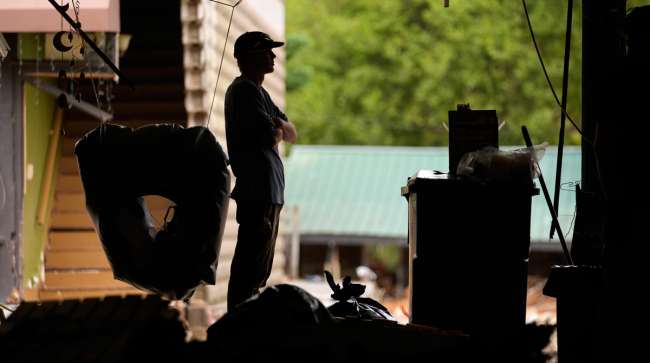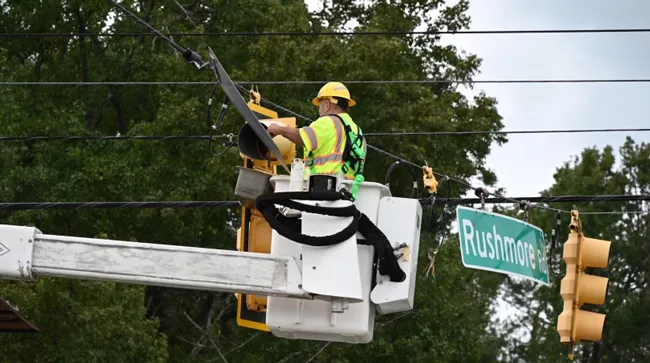Staff Reporter
Trucking Industry Accelerates Hurricane Helene Relief

[Stay on top of transportation news: Get TTNews in your inbox.]
Industry and governmental aid efforts are underway to assist communities reeling from Hurricane Helene, a Category 4 storm that slammed the Gulf Coast on Sept. 26, erasing towns, collapsing bridges and killing more than 180 people as of early October.
As of Oct. 3, governors had declared states of emergency in Florida, Kentucky, North Carolina, South Carolina, Tennessee, Virginia and West Virginia. The Federal Motor Carrier Safety Administration had granted specific hours-of-service and weight limit exemptions across states to speed delivery of relief. Some states paused collection of toll fees to help with recovery efforts.
The storm inflicted winds of up to 140 mph with storm surges of up to 15 feet.
President Joe Biden on Oct. 1 committed resources from the Federal Emergency Management Agency and the Federal Highway Administration to assist in affected areas. The White House also approved disaster declarations for federal funds to help remove debris and assist survivors in the hardest-hit states. By Oct. 2, 4,800 federal personnel were supporting state-led disaster response efforts. Also, USDOT had activated its 24-hour, toll-free routing assistance hotline to help first responders reach stricken areas.
On the industry side, trucking groups mobilized to help.
“The trucking industry has been working nonstop to bring in supplies, aggregates and other emergency materials to Floridians, but are also working to assist our friends in other states, such as North Carolina,” said Florida Trucking Association President and CEO Alix Miller. “Areas just west of us — who have seen multiple hurricane hits in a row — are suffering from flooding, road erosion and homes leveled, in rural, already fragile economies. Our southwest coast area still lacks power, and in some cases, water, where fires broke out and emergency crews were unable to get to residents.” She noted, however, that the state capital of Tallahassee was spared despite being in close proximity to where the hurricane made landfall.
As of Oct. 3, the Florida Department of Transportation had removed 50,000 cubic yards of sand and cleared 12,300 miles of roadway and 1,400 bridges. To clear a pathway for relief efforts, the state deployed 61 crews to remove debris from Interstate 10 less than six hours after the hurricane struck. The state distributed 890,000 shelf-stable meals, 1.2 million liters of water, 32,500 10-pound bags of ice and 42,000 tarps.
North Carolina Trucking Association CEO Ben Greenberg said state lawmakers contacted him soon after the storm hit seeking help from truckers to help deploy aid across 25 counties and some tribal areas. NCTA issued a call seeking truckers to distribute aid and began coordinating deliveries, particularly for liquid baby formula. It also set up a donation section on its website. Greenberg said in some cases supplies needed to be airdropped into collection centers and then transported by truck.
As of early October, officials said travel remained dangerous in the state with about 400 roads closed. The North Carolina Department of Public Safety said more than 440 people and 110 pets had been rescued and nearly 4,700 residents evacuated, and thanked assistance received from 16 states and the federal government in search-and-rescue efforts.
“The response to this crisis so far has been a massive effort of coordination and logistics,” said North Carolina Gov. Roy Cooper. “As emergency responders continue search-and-rescue operations in western North Carolina, local, state, federal, private and nonprofit partners continue to work in concert to provide food, water, shelter and other basic necessities for people in need. Simultaneously, thousands of private-sector and government employees are working 24/7 to restore critical infrastructure including power, water, wastewater treatment, cellular phone service and internet connectivity.”
The South Carolina Trucking Association partnered with the state’s Emergency Management Division to coordinate relief efforts, and asked members with refrigerated trucks, dry vans and flatbeds to assist with deliveries of critical loads such as pallets, sand bags, food, water and other supplies. The group set up a page on its LinkedIn social media account with a form for volunteers to complete.

Meanwhile, the state’s Department of Transportation continued to clear roads where hundreds of trees had fallen and utility companies were working to restore power.
Alabama Trucking Association CEO Mark Colson noted that while truckers are working around the clock to help with the recovery, the strike by dockworkers along the East and Gulf coasts threatened to slow relief efforts longer term.
“It’s important for people to realize that one day of the strike equates to a week’s worth of disruption in the supply chain,” he said. “This timing couldn’t be worse, as we’re experiencing a regional crisis due to the aftermath of Hurricane Helene.”
Colson added, “Truckers and other first responders are on duty 24/7 and prepared to deliver relief goods to the people in need. We encourage all of the essential members of the supply chain to consider those in need during these challenging times.”
Tennessee Gov. Bill Lee on Oct. 2 described both historic destruction in east Tennessee matched by “a historic response” from donations and people helping with recovery efforts. More than 600 buildings were impacted in four counties, with 120 destroyed and 313 sustaining major damage. Five bridges were destroyed.
“There is a tremendous amount of work to do, the damage, the loss of life, there are people still missing,” Lee said. “There is a long road ahead, and we have to continue down that road.”
The American Logistics Aid Network — a logistics industry philanthropic group that assists with disaster recovery efforts — said Oct. 3 it was working with nonprofits involved in initial relief efforts and would soon begin fielding logistics relief requests.
“As Helene’s floodwaters begin to recede and relief organizations get in to assess the damage and determine what’s most needed, they’ll be asking us for a great deal of donated logistics assistance,” said Executive Director Kathy Fulton. “We hope that people will visit our disaster microsite frequently in the coming weeks. That’s where we’ll be posting the open requests we receive for donated logistics assistance.” The group, founded in 2005 in the wake of Hurricane Katrina, is also accepting donations for financial assistance at https://www.alanaid.org/hurricane-helene/.
Moving company Atlas Van Lines announced a $10,000 donation to the American Red Cross to assist with relief efforts.
Want more news? Listen to today's daily briefing below or go here for more info:




